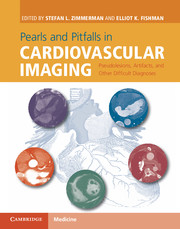 Pearls and Pitfalls in Cardiovascular Imaging
Pearls and Pitfalls in Cardiovascular Imaging from Section 9 - Mesenteric vascular
Published online by Cambridge University Press: 05 June 2015
Imaging description
Non-occlusive mesenteric ischemia (NOMI) is a condition in which bowel ischemia occurs secondary to slow flow in the mesenteric vessels in the absence of thrombosis. CT angiography demonstrates patent origin of the proximal vessels with poor visualization and pruning of the distal vasculature (Figures 78.1, 78.2, 78.3). Delayed opacification of the mesenteric veins may be seen. Thickening of the bowel wall with or without pneumatosis may also be present (Figure 78.3). Selective angiography of mesenteric arteries serves as the gold standard in diagnosing NOMI.
Importance
A low-flow state can be seen in conditions like hypovolemic shock, sepsis, heart failure, hypovolemia due to dehydration, and after dialysis in patients with chronic renal failure. NOMI constitutes about 25% of all cases of acute mesenteric ischemia with mortality as high as 70%. The blood is shunted to maintain perfusion of the brain and heart, and an underlying cardiovascular disease may help precipitate the event. Although reversible, persistent ischemia may lead to bowel infarction. Superimposed infection may also occur. Accurate diagnosis is important as the treatment options differ from occlusive bowel ischemia and include correction of the underlying predisposing factor along with local or systemic vasodilators.
Typical clinical scenario
The typical scenario is of an older patient with underlying cardiovascular disease presenting with hypotension and decreased cardiac output followed by severe abdominal pain. Bowel sounds may be absent and gastrointestinal bleeding can also occur.
Differential diagnosis
Other causes of bowel ischemia such as arterial occlusion from atherosclerotic or thromboembolic disease and venous thrombosis of the mesenteric vasculature may be considered. In both cases filling defect in the effected vasculature may be seen (Figures 78.4 and 78.5).
Teaching point
NOMI is an important cause of ischemic bowel with high mortality and can be differentiated from other causes of bowel ischemia by the presence of narrowed mesenteric vasculature and absence of filling defects within the vessels.
To save this book to your Kindle, first ensure [email protected] is added to your Approved Personal Document E-mail List under your Personal Document Settings on the Manage Your Content and Devices page of your Amazon account. Then enter the ‘name’ part of your Kindle email address below. Find out more about saving to your Kindle.
Note you can select to save to either the @free.kindle.com or @kindle.com variations. ‘@free.kindle.com’ emails are free but can only be saved to your device when it is connected to wi-fi. ‘@kindle.com’ emails can be delivered even when you are not connected to wi-fi, but note that service fees apply.
Find out more about the Kindle Personal Document Service.
To save content items to your account, please confirm that you agree to abide by our usage policies. If this is the first time you use this feature, you will be asked to authorise Cambridge Core to connect with your account. Find out more about saving content to Dropbox.
To save content items to your account, please confirm that you agree to abide by our usage policies. If this is the first time you use this feature, you will be asked to authorise Cambridge Core to connect with your account. Find out more about saving content to Google Drive.